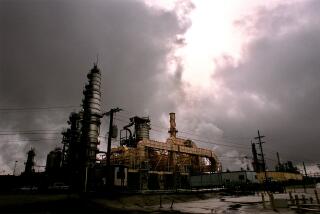Oil Prices Fall on Peace Hopes and OPEC Plans : Energy: Wholesale costs of heating oil and unleaded gasoline also fall as a shooting war in the Persian Gulf seems less likely.
An OPEC accord to boost oil production and suspicions that a negotiated settlement may resolve the Persian Gulf crisis sent crude oil prices sharply down Wednesday to the lowest levels of the week.
Wholesale prices for home heating oil and unleaded gasoline also fell.
Analysts warned, however, that prices could swiftly rebound if hopes for peace evaporate.
The price of the benchmark U.S. crude, West Texas Intermediate, for October delivery fell $1.96 to close at $25.92 a barrel on the New York Mercantile Exchange, 19% lower than the highest closing price last week. Last week’s high--the Aug. 23 close of $32.05--was the highest price in five years. November crude finished at $25.82 on Wednesday, down $1.58 a barrel.
Wednesday’s selloff was the second sharp price drop of the week. On Monday, the price of crude for October delivery fell about $4 a barrel on perceptions that tensions in the Middle East were being reduced. The price rebounded Tuesday by 97 cents.
Prices for futures contracts--deals for future delivery--had jumped dramatically after Iraq invaded oil-rich Kuwait on Aug. 2. The international boycott of crude from Iraq and Kuwait has kept about 4 million barrels a day off world markets.
To cover shortages created by the crisis, the Organization of Petroleum Exporting Countries agreed to let cartel members boost output to prevent the kind of oil price jumps that might endanger the global economy. The agreement frees big producers such as Saudi Arabia and Venezuela, which have the capacity to substantially boost production. Saudi Arabia is expected to increase its output by about 2 million barrels a day and Venezuela by 350,000 to 500,000 barrels a day.
Some of the other 13 OPEC members--Nigeria and the United Arab Emirates, for example--also are expected to raise production. As a result, an additional 3 million to 3.5 million barrels will be produced daily, oil analysts say.
“The market is calmer now that OPEC is making more crude available,” said Randall Rothenberg, a broker at Dean Witter International Energy Futures in New York. “Unless there are hostilities in the Gulf, another sharp upturn (in prices) is unlikely.”
The drop in oil prices was impelled in part by a New York newspaper report that Iraq has made a secret offer to the United States to withdraw from Kuwait in exchange for certain concessions, analysts said. Newsday on Wednesday reported that Iraq last week offered to withdraw and free Western hostages in exchange for guaranteed access to the Persian Gulf, control of the Rumailah oil field that juts into Kuwait and removal of U.N. sanctions.
In addition, traders were calmed by Iraq’s announcement of plans for releasing foreign women and children held in Kuwait and Iraq, market observers said.
“There is a perception in the public and in the oil community that the chances of a shooting war are diminishing,” said Thomas Burns, a San Francisco-based economist at Chevron Corp. “There is a glimmer of hope that there will be a resolution to the crisis.”
Burns said some oil companies, fearing armed conflict between Iraq and a multinational contingent based in Saudi Arabia, began to import more crude earlier this month. The increase in imports was to build up inventories in case an outbreak of war damages oil fields or cuts off access, he said.
The American Petroleum Institute late Tuesday reported that the stock of crude in the U.S. rose 942,000 barrels, to 376.6 million, for the week ended Aug. 24. The buildup surprised and reassured traders, prompting more selling of oil futures, said Thomas Bentz, director of trading at the New York-based United Energy Inc.
On Wednesday, the wholesale price of unleaded gasoline for October delivery fell a steep 3.81 cents to 84.72 cents a gallon. Home heating oil fell 7.88 cents to 71.64 cents per gallon on September contracts.
More to Read
Inside the business of entertainment
The Wide Shot brings you news, analysis and insights on everything from streaming wars to production — and what it all means for the future.
You may occasionally receive promotional content from the Los Angeles Times.










